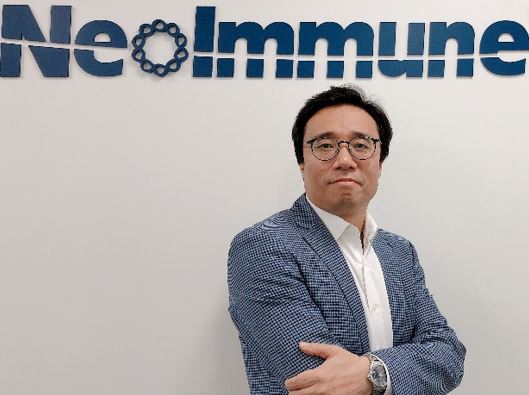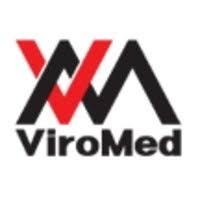검색결과 리스트
글
NeoImmuneTech, 'NT-I7' Four differentiation-based IO development strategies
설정
트랙백
댓글
http://biospectator.com/view/news_view.php?varAtcId=6734
================================================================

▲양세환 네오이뮨텍 대표
NT-I7 (GX-I7, HyLeukin-7), the key pipeline of NeoImmuneTech, is long-acting Interleukin-7 (IL-7). NT-I7 increases the number of T-cells, and improves T-cell function. Recently, increasing attention is being shown to various roles of IL-7 in the anti-cancer and immunity fields, including immune checkpoint inhibitor. From next year, Proof of Concept (PoC) will be commenced in patients with cancer, while post-clinical development for commercialization is planned in 2020.”
Yang Se-hwan, the CEO of NeoImmuneTech, introduced the distinctiveness of NT-I7, and its development strategy. CEO Yang established NeoImmuneTech, the clinical and business development-driven company, in Rockville, Maryland, USA, in 2014, and adopted iL-7 combined with hyFc, one of Genexin’s pipelines.
NT-I7 increases “activity and half-life to 100 hours” compared to previous IL-7
He said “IL-7 plays a mothering role for T-lymphocytes in the immune system”. IL-7 is involved in the development, homeostasis, and survival of T-lymphocytes. In rat, IL-7R knock-out causes thymic atrophy. It also discontinues T-cell development, and causes severe lymphopenia. In contrast, administration of IL-7 in rat or human increases the number of T-cells, and recovers T-cell immune system.
HyFc long-acting platform technology of Genexin applies to NT-I7. HyFc technology is a long-acting technique hybridized with Fc of IgD (hinge-CH2) and IgG4 (CH2-CH3), leading to the target substance being conjugated with Fab fragment of antibody.
As a result of the application of IL-7 to hyFc technology, the in vivo half-life of NT-I7 was increased to approximately 100 hours. The result of in vitro activity assessment demonstrated an increase in NT-I7 activity by 3-times, compared to recombinant IL-7. The company achieved substance stabilization by adding specific amino acid to N-terminal of IL-7. The long-acting IL-7 drug that such an approach applies to was substance-patented, and the patent will expire in 2036.
Result of phase 1 study?
The drug tolerability and safety of NT-I7 was determined in phase 1 study conducted in South Korea. In phase 1 study, NT-I7 (GX-I7) was administered via intramuscular or subcutaneous injection at (20 and 60) µg/kg to healthy subjects to test the drug characteristics.

▲NT-I7 한국 임상 1상 결과. 임상 1상은 건강한 피험자를 대상으로 20㎍/㎏, 60㎍/㎏의 용량으로 NT-I7(GX-I7)을 근육주사 혹은 피하주사해 약물 특성을 테스트했다(NCT02860715).
The results of phase 1 show that NT-I7 doubled the number of CD4 and CD8 T-cells with anticancer activity. NeoImmuneTech expects to further increase the number of CD4 and CD8 T-cells by increasing the clinical dose in patients with cancer. In the determination of Ki-67, the biomarker of T-cell proliferation, Ki-67 of CD4 and CD8 T-cells was largely increased, while Ki-67 of immunoregulatory T-cells was not. Drug safety was also determined. No severe > grade 3 SAE was found in phase 1 study. A common side effect was injection site reaction (ISR) (grades 1–2), most of which was resolved in 1–2 weeks.
Currently NT-I7 clinical studies are ongoing in patients with cancer associated with different types of solid tumor. Based on the safety results from those studies, dose-escalating study is also ongoing. NeoImmuneTech plans to determine the best efficacy dose, and then assess the drug efficacy and safety of NT-I7 in phase 2 study by next year.
‘4 types of distinctiveness’ of NT-I7 as immuno-anticancer drug
CEO Yang said “NT-I7 not only simply increases the number of T-cells, but also produces T-cells with full function”. The advantages of IL-7 as an immune cell proliferating factor can be divided into 4 types, as follow:

Firstly, NeoImmuneTech takes notice of NT-I7 function that increases in vivo memory T-cells. Memory T-cells play an important role in inhibiting relapse in anti-cancer therapy. Secondly, administration of IL-7, upon the release of cancer antigen, extends the diversity of the TCR repertoire, which potentially increases various types of antigen specific T-cell. Thirdly, it was determined by NeoImmuneTech that administration of single dose NT-I7 had anti-cancer effect, and caused increase in CD8+ tumor infiltrating T-cell (TIL) in solid cancer. Fourthly, the number of T-cells increased by IL-7 lasts for several months to more than 1 year. This is attributed to the characteristic of IL-7 that increases T-cell with long lifespan, including naïve T-cells, memory T-cells, etc.
NT-I7 clinical development road map
The company has concentrated on the establishment of clinical protocol, including optimal dose and dosage period of drug in clinical practice, by determining Mode of Action (MoA), and will commence Proof-of-Concept (PoC) study starting from next year. It is aiming at commercialization of NT-I7 as co-administration with lymphopenia treatment and radiation therapy/chemoradiotherapy, and immune checkpoint inhibitor.
NeoImmuneTech is planning different market strategies, depending on treatment. CEO Yang said “NT-I7 as the monotherapy or co-administration with radiation therapy/chemoradiotherapy targeting lymphopenia in patients with cancer will be developed by NeoImmuneTech, and entered into the USA and EU markets”, and added that “We aim to create short-term revenue by technology transfer based on the clinical data of NT-I7 in co-administration with immune checkpoint inhibitor”.
On a long-term basis, it will directly proceed with NT-I7 business in the customized anti-cancer therapy field. NeoImmuneTech is focusing on T-cell therapy (including CAR-T) and customized anti-cancer vaccine. CEO Yang said “We predict that co-administration with these two therapies will be under development within the next 5 to 10 years”, and added “Strategies, such as the adoption of advanced technology, or M&A with a joint venture company and Nasdaq Biotechnology, are under consideration”.
① Lymphopenia and cancer
Normal lymphocyte count ranges (1,500 to 4,000)/µl, and most of the lymphocytes are T-cells. Lymphopenia refers to less than 800/µl. Lymphopenia was found in approximately (20–25) % of patients diagnosed with cancer; more than 90 % of patients with cancer develop lymphopenia after radiation therapy/chemoradiotherapy. It takes several months to years until in vivo T-cells are recovered to normal level in patients with cancer. During this time, there is the potential that cancer cells will re-grow and cancer will relapse, due to the lack of T-cells.
CEO Yang said “The T-cell immune system must be recovered by increasing the number of T-cells in patients with cancer”, and added, “The key factor in such action is IL-7”.
NeoImmuneTech aims to increase the lymphocyte count to normal level in (2–3) weeks with the administration of NT-I7 in patients with cancer who contract lymphopenia caused by radiation therapy/chemoradiotherapy. In China, clinical development to administer NT-I7 in patients with lymphopenia has been rapidly ongoing. IMAP submitted clinical protocol for the administration of NT-I7 in patients with cancer who contracted lymphopenia caused by radiation therapy/chemoradiotherapy approved by CFDA.
②Radiation therapy/chemoradiotherapy
NeoImmuneTech and Genexin are conducting clinical studies in patients with glioblastoma (GBM) in South Korea and the USA. For glioblastoma known as malignant brain cancer, mean survival is approximately (12–15) months after diagnosis. The current therapy for glioblastoma is to administer Temozolomide after surgery, and radiation therapy + Temozolomide (TMZ).
Domestic phase 1/2 studies confirm drug safety and tolerability in patients with brain cancer who have experience with standard therapy, following the administration of HyLeukin-7. Clinical endpoint is used to follow-up change in lymphocyte count, progression-free survival, and overall survival (NCT03619239). A different patient group is used for clinical trials in the USA. Phase 1 studies in the USA target the patient group with severe decrease in CD4 T-cell (CD4 T-cell 400/µl), among the patients with malignant glioma who have received radiation therapy. The maximum tolerable dose (MTD) and optimal biological dose of NT-I7 will be determined by clinical studies. Multi-centered clinical studies (including Johns Hopkins University) will be conducted (NCT02659800), supported by the US National Cancer Institute (NCI).
NeoImmuneTech has been approved by the FDA for clinical protocol for the co-administration of NT-I7 with standard therapy in patients with brain cancer. This protocol is to enter phase 2 studies, to find out the best dose for commercialization.
③ Immune checkpoint inhibitor
NeoImmuneTech and Genexin entered an agreement with Roche and MSD regarding the study of co-administration. According to the agreement, phase 1b/2a clinical study of NT-I7 + Tecentriq (PD-L1) co-administration is planned to be conducted in patients with high-risk advanced skin cancer, starting from this year. This is indicated for melanoma, Merkel cell carcinoma, and cutaneous squamous cell carcinoma. Phase 1b/2 study of NT-I7 + Keytruda co-administration is to be conducted in patients with Triple negative breast cancer, under agreement with MSD, started from this week.
④CAR-T
With a study team from the University of Washington, NeoImmuneTech recently determined the synergistic effect of NT-I7 + CAR-T cytotherapy co-administration in animal experiment. NeoImmuneTech and the University of Washington submitted provisional application on July in the USA as the following.
CEO Yang said “Unmet medical needs for NT-I7 still exist even in the T-cell therapy field (including CAR-T and TIL therapy)”, and pointed out two kinds of clinical needs.
Firstly, CAR-T treatment is an autologous therapy to proliferate and activate T-cells isolated from patient blood. However, T-cells are usually lacking, as most patients with cancer receive radiation therapy/chemoradiotherapy. Sometimes it is difficult to produce CAR-T treatment, due to the severe lack of T-cells in some patients. For those patients, CAR-T treatment can be obtained by increasing T-cells (particularly memory T-cells) by dosing NT-I7 in advance, or isolating memory T-cells.
Secondly, for anti-cancer activity, CAR-T cells administered to the body of patient should remain for long duration. However, administered CAR-T cells fail to proliferate well, or show poor function in some patients. In fact, approximately (4–33.9) % of patients who received CAR-T were reported as relapse of cancer (J Leukoc Biol. 2017 Dec; 102(6):1347–1356).
NeoImmuneTech will commence clinical studies to apply NT-I7 to CAR-T cytotherapy, starting from next year. The company aims to achieve increase in CAR-T cell count, as well as survival, by using injection of NT-I7, after the administration of CAR-T in patients.
⑤Cancer vaccine
CEO Yang said “NT-I7 is characterized as increasing the diversity of the TCR repertoire and increasing the number of T-cells, so it is expected to have a synergistic effect with cancer vaccine”, and added,“T-cells specific to cancer vaccine were determined to be increased by the administration of NT-I7 in co-study with global pharmaceuticals”.
NeoImmuneTech plans to conduct clinical study on BVAC-C (vaccine for cervical cancer) + NT-I7 combination in the USA, starting from next year. BVAC is the cancer vaccine-delivery platform developed by the domestic company, Cellid, which uses B-cells and monocytes as the antigen-presenting cell. Phase 1 study of BVAC-C has been completed by Cellid in South Korea. The rights to BVAC-C in the USA are owned by NeoImmuneTech.
'바이오종목 > 제넥신' 카테고리의 다른 글
| 성영철 제넥신 회장, 가톨릭중앙의료원에 연구기금 100억 기부 (0) | 2018.12.11 |
|---|---|
| <공유>NeoImmuneTech, 'NT-I7'네 가지 차별화 된 IO 개발 전략. (0) | 2018.12.08 |
| 제넥신, 식약처로부터 '하이루킨-7' 병용투여 임상 승인 획득 (0) | 2018.12.03 |
| 제넥신 "하이루킨7, 동물실험서 CAR-T 효과 강화" (0) | 2018.12.03 |
| 알파홀딩스 '온코섹' IL-12·키트루다 병용 차별화 전략 (0) | 2018.11.21 |


RECENT COMMENT